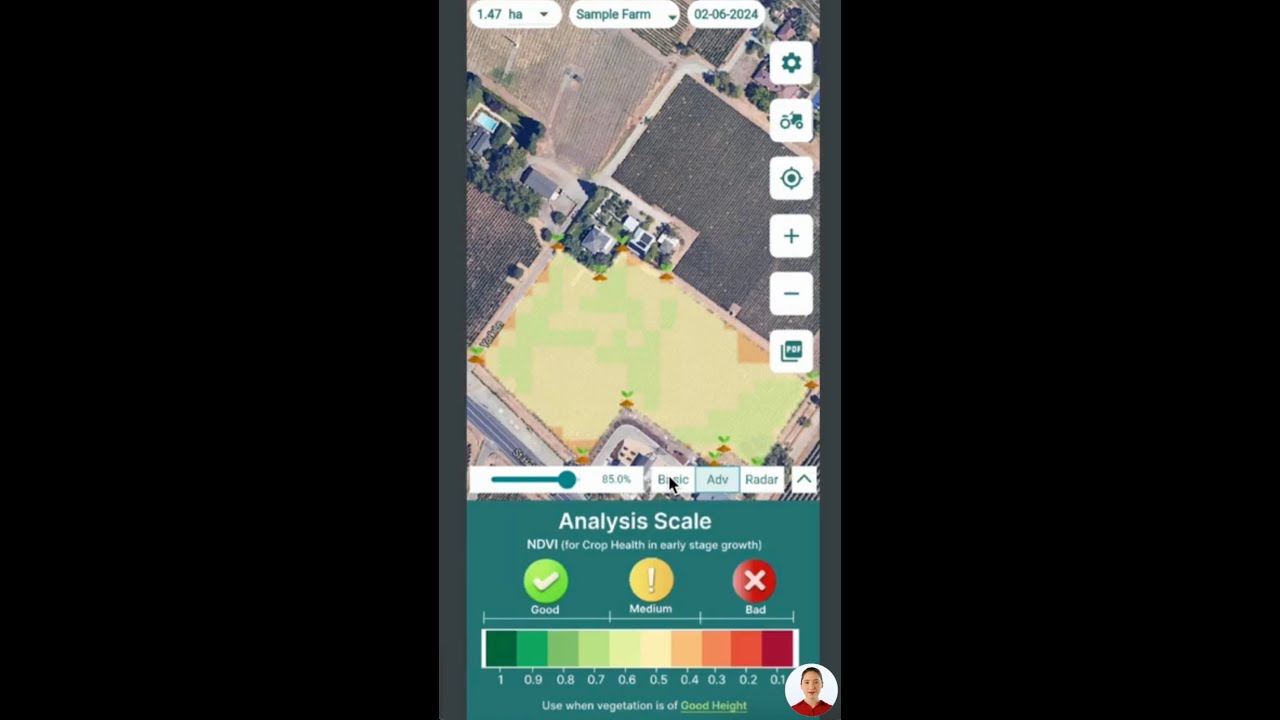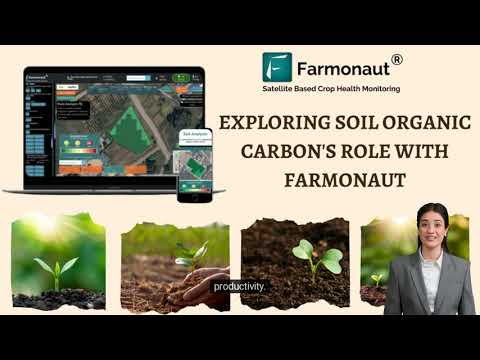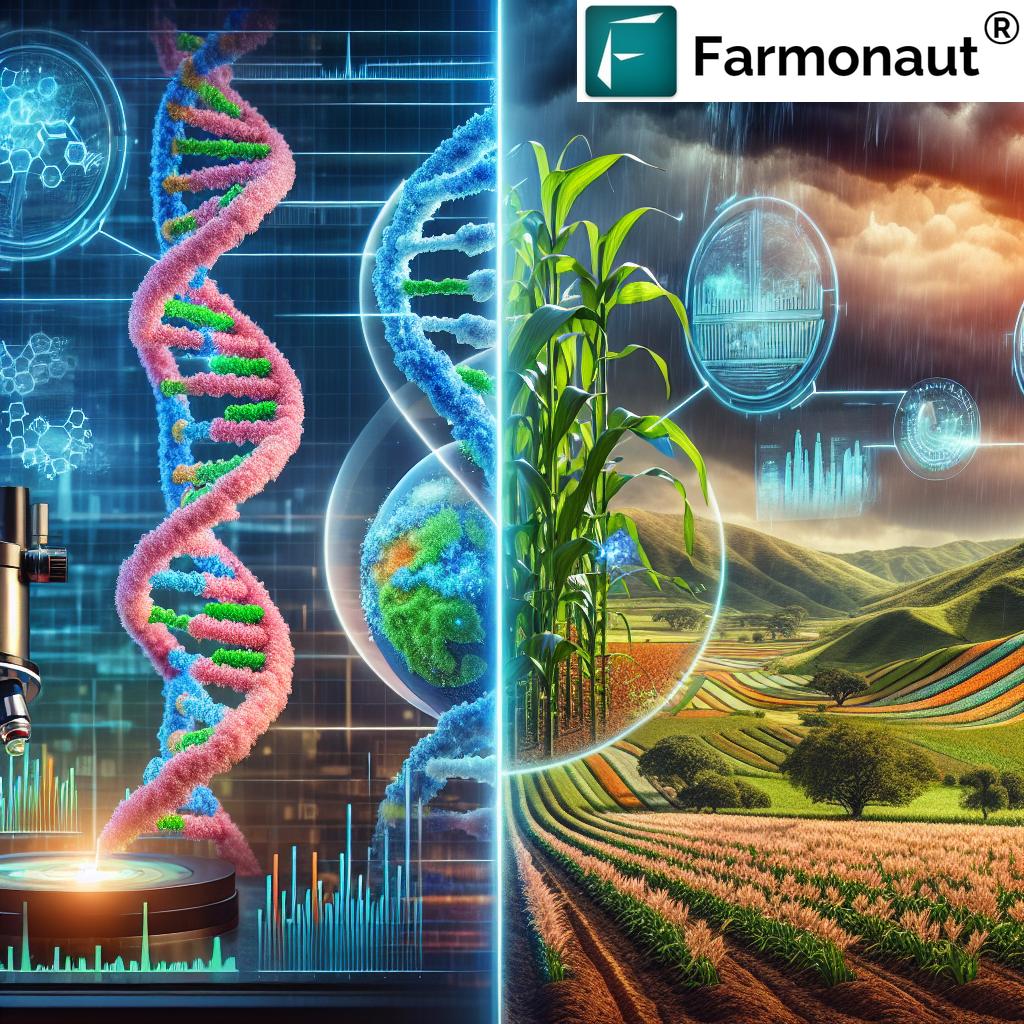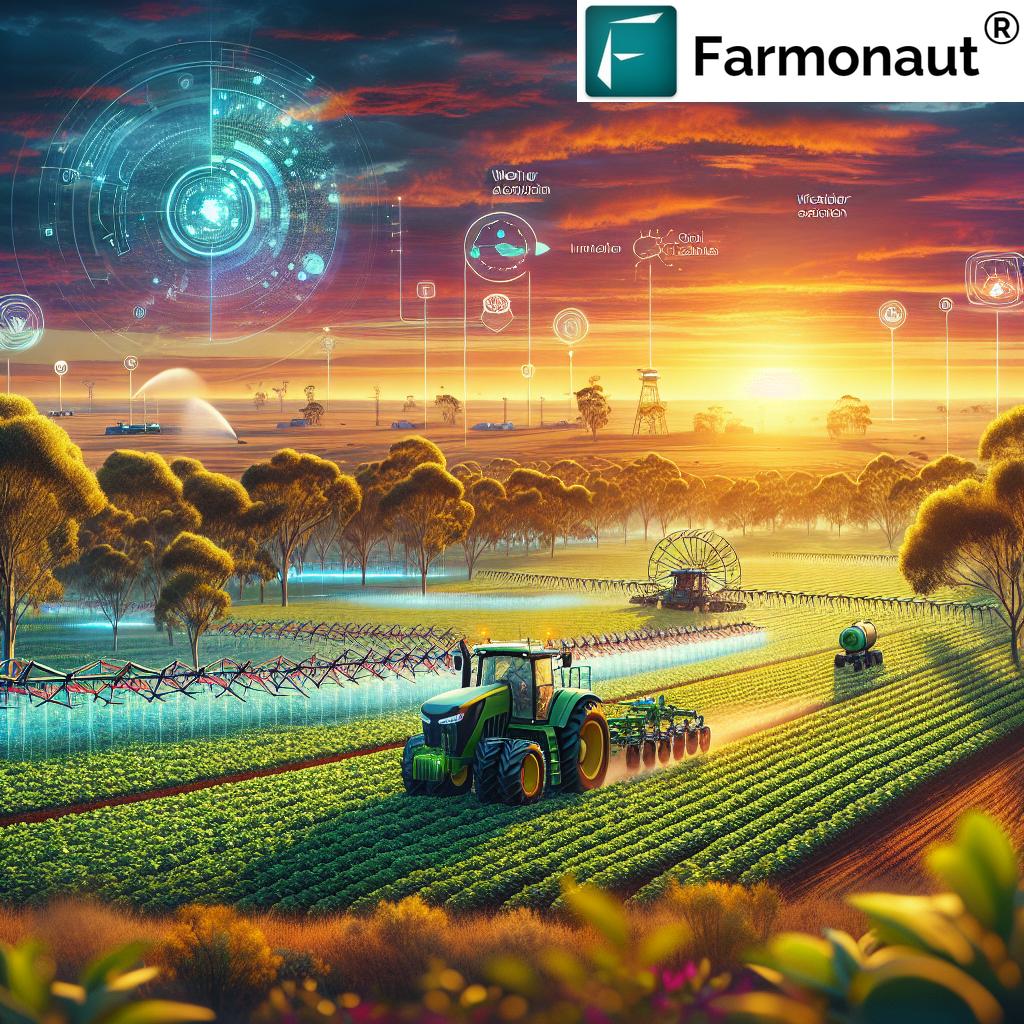Unmasking Chemophobia: How Farmonaut’s Sustainable Agriculture Balances Science and Nature in Australia
“90% of all plants produce natural pesticides to protect themselves, challenging the notion of ‘chemical-free’ agriculture.”
In the vast landscapes of Australia, where agriculture plays a pivotal role in the nation’s economy and food security, a growing challenge threatens to reshape the future of farming: chemophobia. This irrational fear of chemistry in agriculture and food production is rapidly altering consumer perceptions, often misled by marketing buzzwords like “natural” and “clean.” At Farmonaut, we recognize the critical importance of addressing this issue head-on, balancing scientific innovation with environmental stewardship to ensure a sustainable future for Australian agriculture.
Understanding Chemophobia in Agriculture
Chemophobia, at its core, is the fear or aversion to chemicals and chemical substances. In the context of agriculture, this manifests as a widespread misconception that all synthetic chemicals are harmful, while everything “natural” is inherently safe and beneficial. This false dichotomy not only undermines decades of scientific progress but also poses significant challenges to sustainable agriculture and food safety.
- Misconception: All synthetic chemicals are dangerous
- Reality: Both natural and synthetic substances can be harmful or beneficial, depending on their use and concentration
- Impact: Chemophobia can lead to the rejection of safe and effective crop protection methods, potentially compromising food security
As pioneers in agricultural technology, we at Farmonaut understand the importance of addressing these misconceptions. Our satellite-based farm management solutions integrate cutting-edge science with traditional farming practices, offering a balanced approach to modern agriculture.
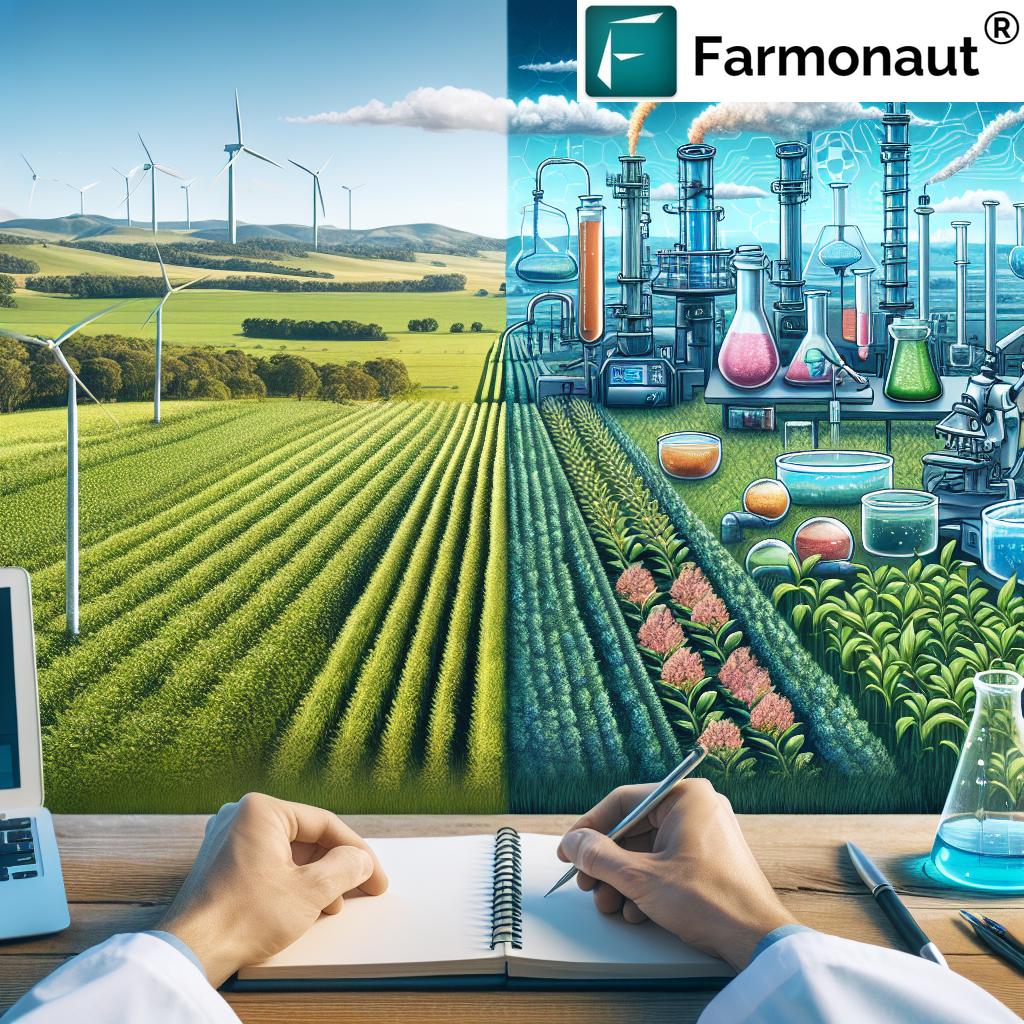
The Science Behind Agricultural Chemistry
To truly unmask chemophobia, we must delve into the science that underpins modern agricultural practices. Toxicology, the study of adverse effects of chemicals on living organisms, plays a crucial role in evaluating the safety and efficacy of substances used in farming.
- Dose-Response Relationship: The fundamental principle that the dose makes the poison
- Risk Assessment: Evaluating the potential hazards and benefits of chemical use in agriculture
- Regulatory Safeguards: Stringent testing and approval processes for agricultural chemicals
At Farmonaut, our Jeevn AI Advisory System leverages these scientific principles to provide personalized farm management strategies. By analyzing satellite data and other inputs, we deliver real-time insights that help farmers make informed decisions about resource usage, including the judicious application of crop protection products.
Natural vs. Synthetic in Farming: Debunking the Myth
One of the most pervasive aspects of chemophobia is the belief that natural substances are always safer than synthetic ones. This oversimplification ignores a fundamental truth: the origin of a substance does not determine its safety or efficacy.
- Natural Toxins: Many plants produce natural pesticides that can be harmful to humans and animals
- Synthetic Benefits: Modern crop protection products are often designed to be more targeted and environmentally friendly
- Integrated Approach: Combining natural and synthetic methods for optimal crop health and environmental protection
Our blockchain-based traceability solutions at Farmonaut provide transparency in agricultural supply chains, allowing consumers to make informed decisions based on accurate information rather than misleading marketing claims.
Modern Crop Protection: Balancing Efficacy and Safety
In the face of evolving environmental challenges and the need to feed a growing global population, modern crop protection plays a vital role in sustainable agriculture. The development of new crop protection products is a rigorous process that combines cutting-edge science with stringent safety protocols.
- Precision Application: Using technology to minimize chemical use while maximizing effectiveness
- Resistance Management: Developing strategies to prevent pest and disease resistance
- Environmental Stewardship: Creating products that break down quickly in the environment, reducing long-term impact
Farmonaut’s satellite-based crop health monitoring system aids in the precise application of crop protection products, ensuring that farmers use only what is necessary, when it is necessary. This not only reduces environmental impact but also improves farm productivity and efficiency.
“Sustainable farming practices can reduce water usage by up to 30% compared to conventional methods, balancing science and nature.”
Toxicology in Agriculture: Ensuring Food Safety
The application of toxicological principles in agriculture is crucial for ensuring food safety and public health. Rigorous testing and continuous monitoring of agricultural chemicals help maintain the delicate balance between effective crop protection and consumer safety.
- Maximum Residue Limits (MRLs): Establishing safe levels of chemical residues in food products
- Chronic Toxicity Studies: Assessing long-term effects of exposure to agricultural chemicals
- Bioaccumulation: Understanding how chemicals move through the food chain
Our commitment to food safety is reflected in Farmonaut’s advanced monitoring tools, which help farmers adhere to best practices and regulatory standards, ensuring that produce meets the highest safety criteria.
Environmental Stewardship in Farming
As we confront the realities of climate change and its impact on agriculture, environmental stewardship becomes paramount. Modern agricultural practices must balance productivity with conservation, ensuring the long-term health of our ecosystems.
- Biodiversity Conservation: Developing farming methods that protect and promote local flora and fauna
- Soil Health: Implementing practices that maintain and improve soil quality
- Water Management: Utilizing technologies to optimize water use in agriculture
Farmonaut’s platform includes tools for carbon footprint tracking, enabling agribusinesses to monitor and reduce their environmental impact. By providing real-time data on emissions, we help farmers take concrete steps towards sustainability and compliance with environmental regulations.
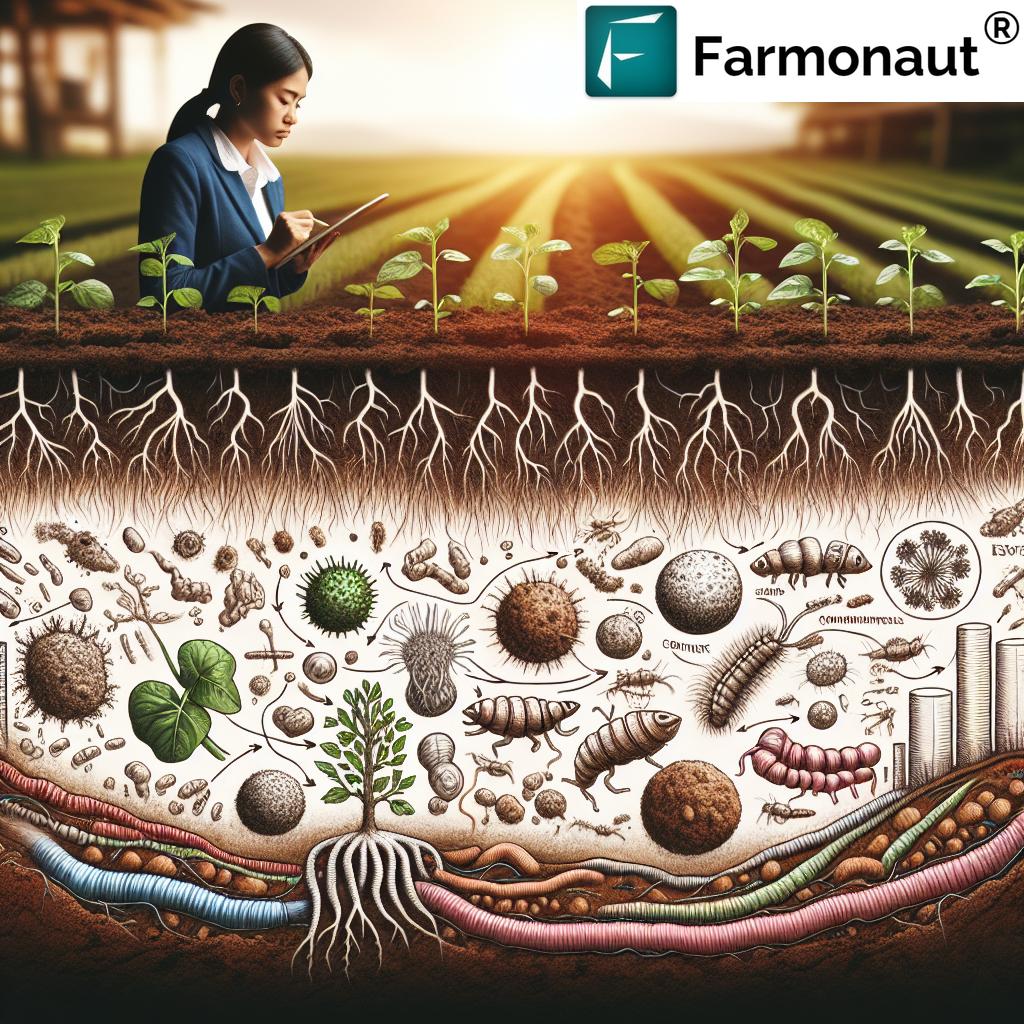
Chemistry in Food Production: Beyond the Farm
The role of chemistry in agriculture extends beyond the field, playing a crucial part in food processing, packaging, and preservation. Understanding these applications is essential for a comprehensive view of food safety and quality.
- Food Additives: Enhancing shelf life, flavor, and nutritional value
- Packaging Innovations: Developing materials that extend freshness and reduce waste
- Quality Control: Using chemical analysis to ensure food safety and consistency
At Farmonaut, we recognize the importance of this extended view of agricultural chemistry. Our blockchain-based traceability solutions provide transparency throughout the entire food supply chain, from farm to table, fostering trust and informed decision-making among consumers.
Agricultural Biotechnology Benefits
Biotechnology offers tremendous potential for addressing global agricultural challenges, from increasing crop yields to enhancing nutritional value. However, it’s often misunderstood and subject to the same chemophobic reactions as other agricultural innovations.
- Genetic Engineering: Developing crops with improved resistance to pests, diseases, and environmental stresses
- Biofortification: Enhancing the nutritional content of staple crops
- Sustainable Intensification: Increasing productivity while reducing environmental impact
Our AI-driven advisory system at Farmonaut incorporates the latest advancements in agricultural biotechnology, providing farmers with tailored recommendations that balance productivity with sustainability.
Crop Science Innovations: Shaping the Future of Agriculture
The field of crop science is constantly evolving, driven by the need to address emerging challenges in agriculture. From climate-resilient crop varieties to precision farming techniques, these innovations are crucial for the future of food security.
- CRISPR Technology: Precise genetic editing for improved crop traits
- Nanotechnology: Developing targeted delivery systems for nutrients and crop protection products
- AI and Machine Learning: Enhancing predictive modeling for crop management
Farmonaut’s platform integrates these cutting-edge innovations, providing farmers with access to advanced crop science through our satellite-based monitoring and AI-driven advisory services.
Climate Change and Agriculture: Adapting for the Future
Climate change poses significant challenges to agriculture, necessitating adaptive strategies and innovative solutions. The interplay between climate change, crop protection, and food security is complex and requires a nuanced approach.
- Drought-Resistant Crops: Developing varieties that can thrive in water-stressed conditions
- Pest Migration: Addressing shifts in pest populations due to changing climate patterns
- Carbon Sequestration: Implementing farming practices that capture and store atmospheric carbon
Our carbon footprinting tools at Farmonaut help farmers and agribusinesses monitor their environmental impact and adapt their practices to mitigate climate change effects. By providing real-time data and insights, we empower farmers to make climate-smart decisions.
| Chemical Name | Common Usage | Public Perception (1-5) | Scientific Safety Rating (1-5) | Environmental Impact | Sustainable Alternatives |
|---|---|---|---|---|---|
| Glyphosate | Herbicide | 1 | 4 | Low | Cover cropping, mechanical weeding |
| Neonicotinoids | Insecticide | 2 | 3 | Medium | Biological pest control, crop rotation |
| Copper Sulfate | Fungicide | 3 | 3 | Medium | Resistant varieties, cultural practices |
| Bt (Bacillus thuringiensis) | Insecticide | 4 | 5 | Low | Already considered a sustainable option |
| Synthetic Fertilizers | Plant Nutrition | 2 | 4 | Medium | Organic fertilizers, green manures |
The Role of Education in Combating Chemophobia
Addressing chemophobia requires a concerted effort to improve scientific literacy and promote evidence-based decision-making. Education plays a crucial role in bridging the gap between public perception and scientific reality.
- Public Outreach: Developing programs to explain the science behind agricultural chemistry
- Farmer Training: Providing resources on best practices for chemical use and safety
- Consumer Education: Offering clear, accessible information on food production and safety
At Farmonaut, we’re committed to education and transparency. Our platform not only provides advanced farming tools but also serves as an educational resource, helping farmers and consumers understand the science behind sustainable agriculture.
Regulatory Framework and Safety Assurance
A robust regulatory framework is essential for ensuring the safe and effective use of agricultural chemicals. In Australia, stringent regulations govern the approval, use, and monitoring of these substances.
- Approval Process: Rigorous testing and evaluation before chemicals are approved for use
- Monitoring Programs: Ongoing surveillance to ensure compliance and safety
- International Cooperation: Harmonizing standards and sharing data globally
Farmonaut’s platform helps farmers navigate these regulatory requirements, ensuring compliance while optimizing farm productivity. Our satellite-based monitoring tools provide real-time data that can aid in regulatory reporting and compliance verification.
Future Innovations in Sustainable Agriculture
As we look to the future, the integration of advanced technologies with sustainable farming practices holds immense promise for addressing global food security challenges while minimizing environmental impact.
- Vertical Farming: Maximizing production in urban environments
- Precision Fermentation: Producing animal proteins without livestock
- Robotics and Automation: Enhancing efficiency and reducing labor needs
At Farmonaut, we’re constantly evolving our platform to incorporate these emerging technologies. Our commitment to innovation ensures that farmers have access to the most advanced tools for sustainable agriculture.
Conclusion: Balancing Science and Nature for a Sustainable Future
Unmasking chemophobia in agriculture is crucial for ensuring a sustainable and food-secure future. By embracing scientific advancements while respecting environmental stewardship, we can create a balanced approach to modern farming that meets the needs of both people and the planet.
At Farmonaut, we’re dedicated to bridging the gap between traditional farming wisdom and cutting-edge technology. Our satellite-based farm management solutions, AI-driven advisory systems, and blockchain traceability tools empower farmers to make informed decisions that balance productivity with sustainability.
As we confront the challenges of climate change, population growth, and resource scarcity, the importance of science-based agriculture becomes ever more apparent. By fostering understanding and promoting evidence-based practices, we can overcome chemophobia and pave the way for a more sustainable and prosperous agricultural future in Australia and beyond.
Join us in this journey towards sustainable agriculture. Explore our platform and discover how Farmonaut can help you embrace the future of farming.
Access our services:
For developers interested in integrating our satellite and weather data into their systems, check out our API and API Developer Docs.
Frequently Asked Questions
- What is chemophobia in agriculture?
Chemophobia in agriculture refers to the irrational fear or aversion to chemicals used in farming and food production, often based on misconceptions rather than scientific evidence. - Are natural pesticides always safer than synthetic ones?
No, the safety of a pesticide depends on its specific properties and usage, not whether it’s natural or synthetic. Some natural pesticides can be more harmful than synthetic alternatives. - How does Farmonaut contribute to sustainable agriculture?
Farmonaut provides satellite-based farm management solutions, AI-driven advisory systems, and tools for resource optimization, helping farmers make data-driven decisions that balance productivity with environmental stewardship. - What role does biotechnology play in modern agriculture?
Biotechnology in agriculture helps develop crops with improved resistance to pests, diseases, and environmental stresses, as well as enhanced nutritional content, contributing to food security and sustainability. - How can farmers adapt to climate change?
Farmers can adapt to climate change by using drought-resistant crops, implementing water-efficient irrigation systems, and adopting climate-smart farming practices. Farmonaut’s tools help monitor and manage these adaptations.


